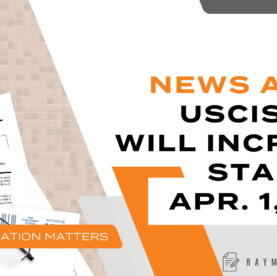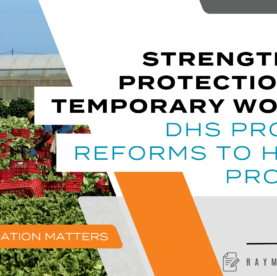Amid Tech Layoffs, Demand for H-1B Visas Reaches New Highs

In recent years, the H-1B visa program has become a highly-debated topic. The program, which allows employers to hire highly skilled foreign workers, has been criticized by some for displacing American workers and contributing to wage stagnation. Others claim the program is necessary to support many American industries. Despite a recent increase in layoffs throughout the tech industry, demand for H-1B visas recently reached new highs.
What is the H-1B Visa?
The H-1B is a temporary, nonimmigrant visa category that allows employers to petition on behalf of highly educated foreign professionals to work in specialty occupations. Normally, the jobs require at least a bachelor’s degree. Generally, positions are in the fields of science, technology, engineering, and mathematics (“STEM”). This enhances American competitiveness in the global economy. In fact, the Biden administration recently expanded eligible fields of study that qualify under the program. The H-1B visa program is an essential tool for American businesses, especially in the technology sector, where a significant percentage of the workforce is made up of foreign-born workers. Recent data indicates that “immigrants made up almost one-fourth, or 23.1 percent, of all STEM workers” in the United States.
The H-1B visa allows U.S. employers to fill critically important jobs with foreign workers. While many critics of the H-1B visa claim it limits job opportunities for U.S. workers, proponents suggest that H-1B workers offer critical support to the U.S. economy. In recent years, the program has also been mired in controversy due to high denial rate. These denials have made it difficult for companies to bring in foreign workers. However, the denial rate has plummeted under the Biden administration.
H-1B Demand Remains High Despite Tech Layoffs
According to a recent Bloomberg Law report, the number of H-1B visas for the upcoming fiscal year is expected to reach its cap of 85,000. The registration period for the 2024 fiscal year is now open and is set to close on March 17, 2023. Despite a significant rise in layoffs, with companies such as Cisco, IBM, and Salesforce announcing job cuts, H-1B visa interest remains strong. This is due to the low registration cost and the ongoing labor crunch for talent in certain tech fields.
The COVID-19 pandemic also contributed to the demand for H-1B workers. Many companies have shifted to remote work and are looking to hire workers from anywhere in the world. This has opened up new opportunities for H-1B workers, who may be unable to relocate to the U.S.
An Increasingly Politicized H-1B Visa Program
Despite the ongoing demand for H-1B workers, the program continues to face criticism. Critics argue that the program allows companies to hire foreign workers at lower wages than American workers. This, in turn, depresses wages for all workers in the industry. Some have raised concerns about the quality of H-1B workers, claiming that many are not highly skilled, but are willing to work for lower wages. Additionally, there have been cases of H-1B workers being exploited by their employers. These employers use an employee’s visa status to prevent them from leaving or reporting workplace abuses.
In response to these concerns, the U.S. government has taken steps to tighten regulations around the H-1B program. In 2020, the Trump administration implemented a series of reforms aimed at preventing abuse of the program. These reforms also ensure that only highly skilled workers are hired. However, the reforms were criticized as being too restrictive. This, in turn, made it more difficult for companies to hire the critical workers.
The Biden administration has not announced any major changes to the H-1B program. It is expected that the Biden administration will take a more lenient approach than the previous administration. President Biden previously expressed support for the program, arguing that it is necessary to ensure that American companies can compete globally.
While the COVID-19 pandemic has caused significant layoffs in the tech industry, demand for H-1B visas remains high. The program continues to be controversial, with some arguing that it harms American workers while others argue that it is necessary to fill highly specialized positions. It remains to be seen how the Biden administration will approach the issue, but it is likely that the program will continue to play a significant role in the U.S. economy for years to come.




